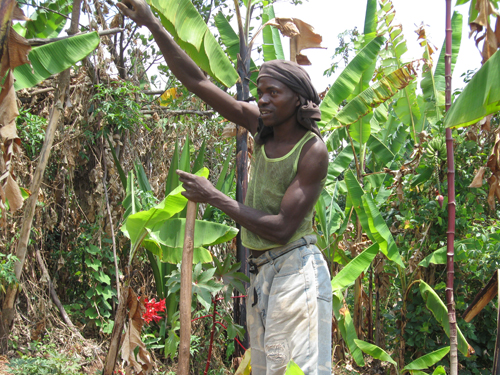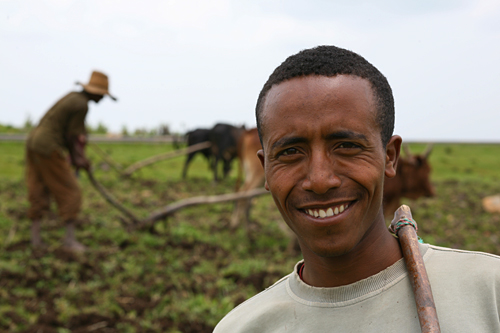African conference on ecological agriculture

Conference on
Ecological Agriculture: Mitigating Climate Change, Providing Food Security And Self-Reliance For
Rural Livelihoods In Africa
AU Headquarters, Addis Ababa, 26-28 November 2008
CONCLUSIONS and RECOMMENDATIONS
Introduction
The Conference on Ecological Agriculture: Mitigating Climate Change, Providing Food Security and Self-Reliance for Rural Livelihoods in Africa was held in Addis Ababa, Ethiopia on 26-28 November 2008. It was organised by the African Union (AU), UN Food and Agriculture Organization (FAO) and the Ministry of Agriculture and Rural Development of Ethiopia, in collaboration with the Institute for Sustainable Development (ISD), Ethiopia and the Third World Network (TWN).
Over 80 participants from 15 African countries - Benin, Burundi, Djibouti, Ethiopia, Kenya, Madagascar, Malawi, Mali, Nigeria, Rwanda, Sudan, Tanzania, Uganda, Zambia and Zimbabwe - attended the Conference. The participants included policy makers, agriculture experts representing governments, NGOs, farmers’ organisations, and universities, and international and regional bodies such as the AU, FAO, United Nations Conference on Trade and Development (UNCTAD), the UNEP-UNCTAD CBTF, International Food Policy Research Institute (IFPRI), International Assessment on Agricultural Knowledge, Science and Technology for Development (IAASTD) and World Food Programme (WFP).
The Conference was preceded by a field visit to the Axum area in Tigray Region in northern Ethiopia on 23-25 November 2008, to visit some of the communities of smallholder farmers that the Tigray Regional Bureau of Agriculture and Rural Development of Ethiopia and ISD have been working with on ecological agriculture since 1996. This was an appropriate experience to help focus attention on the aspects of the ecosystem that can easily respond to appropriate management, so as to stimulate discussion on experiences relevant for raising agricultural production, mitigating and adapting to climate change, and achieving the Millennium Development Goals (MDGs) in Africa.
The following are among the significant views, conclusions and recommendations expressed by participants during the Conference. Detailed recommendations from the Working Groups that discussed some of the issues in-depth are annexed to this report.
General
The Conference heard several presentations and discussed the challenges facing African agriculture, not least among them the global food crisis, climate change and the conflicts with inappropriate biofuels development. Moreover, land degradation and the consequential loss of soil fertility, which are exacerbated by pests and erratic rainfall associate with climate change, are major constraints to improving agricultural production in Africa. Consequently, many local communities in African countries are food insecure. Trade policies also have implications for African food security and rural development, which need to be addressed, to stop the worrying trend of food import dependency and increasing vulnerability to external shocks.
The steep rise in petroleum prices and the consequent increase in the cost of chemical fertilizers and pesticides are making it essential to improve soil fertility and agricultural productivity in Africa through effective management of the local resources that are found in the agricultural and surrounding ecosystems. Many diverse and creative ecological agriculture (including organic agriculture) practices based on rich traditional knowledge and agro-biodiversity are found in Africa. Where supported by appropriate research and policy, it has been shown that these have been effective in tackling poverty and improving livelihoods.
In addition, this opens up the opportunity for Africa’s smallholder farmers to become recognized as organic farmers producing for the growing global market fetching fair prices for their products. The global organic market growth has been about 15 per cent per year over the past decade. Internal markets for organic products are also developing rapidly, particularly where consumers are made aware of the improvements to health from eating organic food.
The Conference heard presentations on the potential of ecological agriculture, including organic agriculture, to meet food security needs in Africa. Concrete examples and lessons learnt were presented from several African countries on practices that have successfully increased productivity and yields of crops, provided ecologically sound pest, weed and disease control, resulted in better water availability, met household and local food security needs, increased household income and improved livelihood opportunities, especially for women who are the majority of Africa’s farmers. Other presentations focused on the potential of ecological agriculture to mitigate climate change, and to provide farmers with the means to adapt to climate change.
Participants discussed the need for appropriate national policies to support and build the capacity of farmers and agricultural professionals to implement and mainstream ecological/organic agriculture in Africa. Some of the major barriers and challenges to a transition to ecological agriculture were identified, and recommendations for charting the way forward in terms of policies, action plans and regional and international cooperation were made.


Main conclusions
1. Ecological agriculture holds significant promise for increasing the productivity of Africa’s smallholder farmers, with consequent positive impacts on food security and food self-reliance. This is demonstrated by efforts such as the Tigray Project, now working with over 20 000 farming families in Ethiopia, where crop yields of major cereals and pulses have almost doubled using ecological agricultural practices such as composting, water and soil conservation activities, agroforestry and crop diversification. Although Tigray was previously known as one of the most degraded Regions of Ethiopia, yet over the 12 years of the introduction and expansion of ecological agriculture, the use of chemical fertilizers has steadily decreased while total grain production has steadily increased.
2. As most poor farmers, particularly in degraded lands and in market-marginalised areas, are not able to afford external inputs, the principles and approach of the Tigray Project, based on ecological agriculture, offer farmers and their families a real and affordable means to break out of poverty and achieve food security, provided that relevant government commitment, support and capacity-building is provided to them.
3. Ecological agriculture also provides many other benefits, including to the environment, such as addressing land degradation and reducing the use of polluting chemical inputs, with consequent beneficial health impacts. Ecological agriculture helps foster agrobiodiversity and other essential environmental services, which improves agroecosystem resilience, helping farmers to better face risks and uncertainties. The productivity and diversity of crops also increases incomes and improves rural livelihoods.
4. Ecological agriculture has high climate change mitigation potential; for example avoiding the use of synthetic fertilizers results in reduced greenhouse gas emissions, particularly nitrous oxide. Ecological agriculture practices such as using leguminous crops, crop residues, cover crops and agroforestry enhance soil fertility and lead to the stabilization of soil organic matter and in many cases to a heightened sequestration of carbon dioxide in the soils.
5. Ecological agriculture assists farmers in adapting to climate change by establishing conditions that increase agroecosystem resilience to stress. Increasing an agroecosystem’s adaptive capacity allows it to better withstand climate variability, including erratic rainfall and temperature variations and other unexpected events. Drawing on strong local community and farmers’ knowledge and agrobiodiversity, ecological agriculture improves soil quality by enhancing soil structure and its organic matter content, which in turn promotes efficient water use and retains soil moisture. Such conditions simultaneously enhance soil conservation and soil fertility, leading to increased crop yields.
6. The development and growing of biofuels should not compete with food and other crops, and thus require comprehensive impact assessments. Locally-controlled bioenergy production that makes use of agricultural waste and biomass, such as through biogas digesters, could provide sustainable energy generation.
7. Food and energy demand and climate change are inducing land use changes and land access issues, which threaten the viability of farming and rural livelihoods. The resilience of agroecosystems can only be built by empowering local communities, particularly women, to rehabilitate, adapt and improve their natural resource base for continued productivity, and by giving them the appropriate legal backing.
8. The implementation and scaling up of ecological agriculture face several constraints, including the lack of policy support at local, national, regional and international levels, resource and capacity constraints, and a lack of awareness and inadequate information, training and research on ecological agriculture at all levels.
READ THE REST AT: http://www.twnside.org.sg/title2/susagri/susagri063.htm


Etiquetas: Africa, Alternativas

0 Comentarios:
Publicar un comentario
Suscribirse a Comentarios de la entrada [Atom]
<< Página Principal